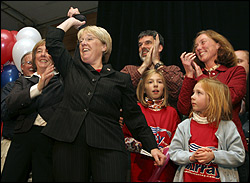When you blend Democratic blue and Republican red, you get purple, and Washington voters turned out in record numbers Tuesday, Nov. 2, to affirm their constitutional right to mix colors. Voters gave big victories to Democrats at the top of the ballot in choosing presidential candidate Sen. John Kerry of Massachusetts and incumbent U.S. Sen. Patty Murray of Washington. The governor’s race, however, produced no clear winner on election night as Democratic Attorney General Christine Gregoire held onto the narrowest of leads over Republican former state Sen. Dino Rossi. That race was to be decided by absentee votes later in the week. In the state’s other competitive open seats, voters preferred Republicans, electing Rob McKenna as attorney general and choosing two new Republican members of Congress—King County Sheriff Dave Reichert in the Seattle suburban 8th District and Cathy McMorris in Spokane’s 5th District.
Voters put an exclamation point next to their independence by approving Initiative 872, which enacts a non-partisan primary next time around. Having voted in a partisan primary for the first time in 69 years in September, voters spurned the wishes of the two major political parties and opted for a system in which the top two vote-getters in the primary, regardless of party, advance to future general elections.
Looking over the split ticket from top to bottom, Republican Secretary of State Sam Reed says: “This is a state where people take pride in voting for the person, not the party.” Reed himself easily won re-election.
In public opinion surveys and in massive street demonstrations, Washington has strongly opposed the war in Iraq. The electorate’s anti-war stance was strongly demonstrated again in the vote for Kerry over President George Bush, and for Murray over her challenger, U.S. Rep. George Nethercutt of Spokane.
“There were no coattails,” says GOP consultant Dave Mortenson. Instead, voters seemed to focus on their pocketbooks when it came to key statewide races. They overwhelmingly rejected Initiative 884, which would have raised $1 billion dollars annually for education with a 1-cent increase per dollar of the state sales tax.
They also responded to Republican gubernatorial candidate Rossi’s clear, simple message that, as a successful businessman, he can tackle the state’s economic problems. Gregoire never developed a strong message, relying instead on her compelling biography and her popularity as a three-term state attorney general. Says Rossi spokesperson Mary Lane: “She didn’t have a message, and we did.”
Rossi led in 36 of Washington’s 39 counties by the end of the evening. Only a huge lead of 100,000 votes in King County, out of 1.7 million votes counted statewide, kept Gregoire ahead. “It’s King County versus the rest of the state,” says Republican consultant Mortenson.
Meanwhile, one King County Republican was charming voters everywhere. As family and campaign workers gathered around him at a Bellevue victory party, King County Council member Rob McKenna called his campaign for attorney general “a long walk” and, clearly tired from the hike, told supporters, “Politics is not life, family is life, right?” His opponent, Deborah Senn, a Seattle Democrat, failed to fight off an image of combativeness she earned as a two-term state insurance commissioner. Senn made no secret of her contempt for corporate insurance practices and still testifies as an expert witness against insurance companies. In her attorney general campaign, she billed herself as a consumer advocate who is itching to take on corporations and high gas prices. Actually, Senn “was only talking about attack ads and things that didn’t matter,” says McKenna spokesperson Craig Wright. McKenna “made an attempt to reach voters across the state, and he did that through hard work. He has a good track record as an elected leader, and that resonated with the voters.” McKenna promised to work for liability reform and raise risk-management consciousness in the AG’s office, which has been rocked by several multimillion-dollar legal setbacks under the sometimes absent-minded Gregoire. McKenna, a Bellevue Republican, has vowed to focus the office’s enforcement efforts on fighting identity theft and reining in “rogue bureaucrats.”
In a race that was a rerun of a few years back, Terry Bergeson, 64, of Puyallup, hung onto her seat as superintendent of public instruction by defeating former state superintendent Judith Billings. A former Tacoma schoolteacher, Bergeson is considered a reformer who promotes new testing and learning measures. Billings, who held the office for two terms starting in 1989, was accused of being out of touch with a changing educational system.
Doug Sutherland, a onetime Boeing worker, Tacoma mayor, and Pierce County executive, won his second term as commissioner of public lands in part by promising to turn more idle state land into recreational areas. Cruising along at age 67, Sutherland, a Lacey Republican, said he had plans to increase taxpayer land holdings by exchanging or selling some state properties. In late returns, he was increasing his lead over a Democratic state representative from Edmonds, Mike Cooper.




